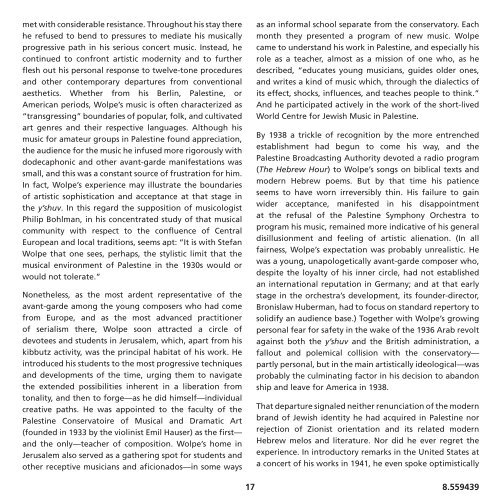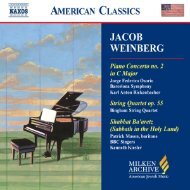Download Liner Notes PDF - Milken Archive of Jewish Music
Download Liner Notes PDF - Milken Archive of Jewish Music
Download Liner Notes PDF - Milken Archive of Jewish Music
You also want an ePaper? Increase the reach of your titles
YUMPU automatically turns print PDFs into web optimized ePapers that Google loves.
met with considerable resistance. Throughout his stay therehe refused to bend to pressures to mediate his musicallyprogressive path in his serious concert music. Instead, hecontinued to confront artistic modernity and to furtherflesh out his personal response to twelve-tone proceduresand other contemporary departures from conventionalaesthetics. Whether from his Berlin, Palestine, orAmerican periods, Wolpe’s music is <strong>of</strong>ten characterized as“transgressing” boundaries <strong>of</strong> popular, folk, and cultivatedart genres and their respective languages. Although hismusic for amateur groups in Palestine found appreciation,the audience for the music he infused more rigorously withdodecaphonic and other avant-garde manifestations wassmall, and this was a constant source <strong>of</strong> frustration for him.In fact, Wolpe’s experience may illustrate the boundaries<strong>of</strong> artistic sophistication and acceptance at that stage inthe y’shuv. In this regard the supposition <strong>of</strong> musicologistPhilip Bohlman, in his concentrated study <strong>of</strong> that musicalcommunity with respect to the confluence <strong>of</strong> CentralEuropean and local traditions, seems apt: “It is with StefanWolpe that one sees, perhaps, the stylistic limit that themusical environment <strong>of</strong> Palestine in the 1930s would orwould not tolerate.”Nonetheless, as the most ardent representative <strong>of</strong> theavant-garde among the young composers who had comefrom Europe, and as the most advanced practitioner<strong>of</strong> serialism there, Wolpe soon attracted a circle <strong>of</strong>devotees and students in Jerusalem, which, apart from hiskibbutz activity, was the principal habitat <strong>of</strong> his work. Heintroduced his students to the most progressive techniquesand developments <strong>of</strong> the time, urging them to navigatethe extended possibilities inherent in a liberation fromtonality, and then to forge—as he did himself—individualcreative paths. He was appointed to the faculty <strong>of</strong> thePalestine Conservatoire <strong>of</strong> <strong>Music</strong>al and Dramatic Art(founded in 1933 by the violinist Emil Hauser) as the first—and the only—teacher <strong>of</strong> composition. Wolpe’s home inJerusalem also served as a gathering spot for students andother receptive musicians and aficionados—in some waysas an informal school separate from the conservatory. Eachmonth they presented a program <strong>of</strong> new music. Wolpecame to understand his work in Palestine, and especially hisrole as a teacher, almost as a mission <strong>of</strong> one who, as hedescribed, “educates young musicians, guides older ones,and writes a kind <strong>of</strong> music which, through the dialectics <strong>of</strong>its effect, shocks, influences, and teaches people to think.”And he participated actively in the work <strong>of</strong> the short-livedWorld Centre for <strong>Jewish</strong> <strong>Music</strong> in Palestine.By 1938 a trickle <strong>of</strong> recognition by the more entrenchedestablishment had begun to come his way, and thePalestine Broadcasting Authority devoted a radio program(The Hebrew Hour) to Wolpe’s songs on biblical texts andmodern Hebrew poems. But by that time his patienceseems to have worn irreversibly thin. His failure to gainwider acceptance, manifested in his disappointmentat the refusal <strong>of</strong> the Palestine Symphony Orchestra toprogram his music, remained more indicative <strong>of</strong> his generaldisillusionment and feeling <strong>of</strong> artistic alienation. (In allfairness, Wolpe’s expectation was probably unrealistic. Hewas a young, unapologetically avant-garde composer who,despite the loyalty <strong>of</strong> his inner circle, had not establishedan international reputation in Germany; and at that earlystage in the orchestra’s development, its founder-director,Bronislaw Huberman, had to focus on standard repertory tosolidify an audience base.) Together with Wolpe’s growingpersonal fear for safety in the wake <strong>of</strong> the 1936 Arab revoltagainst both the y’shuv and the British administration, afallout and polemical collision with the conservatory—partly personal, but in the main artistically ideological—wasprobably the culminating factor in his decision to abandonship and leave for America in 1938.That departure signaled neither renunciation <strong>of</strong> the modernbrand <strong>of</strong> <strong>Jewish</strong> identity he had acquired in Palestine norrejection <strong>of</strong> Zionist orientation and its related modernHebrew melos and literature. Nor did he ever regret theexperience. In introductory remarks in the United States ata concert <strong>of</strong> his works in 1941, he even spoke optimistically17 8.559439
















